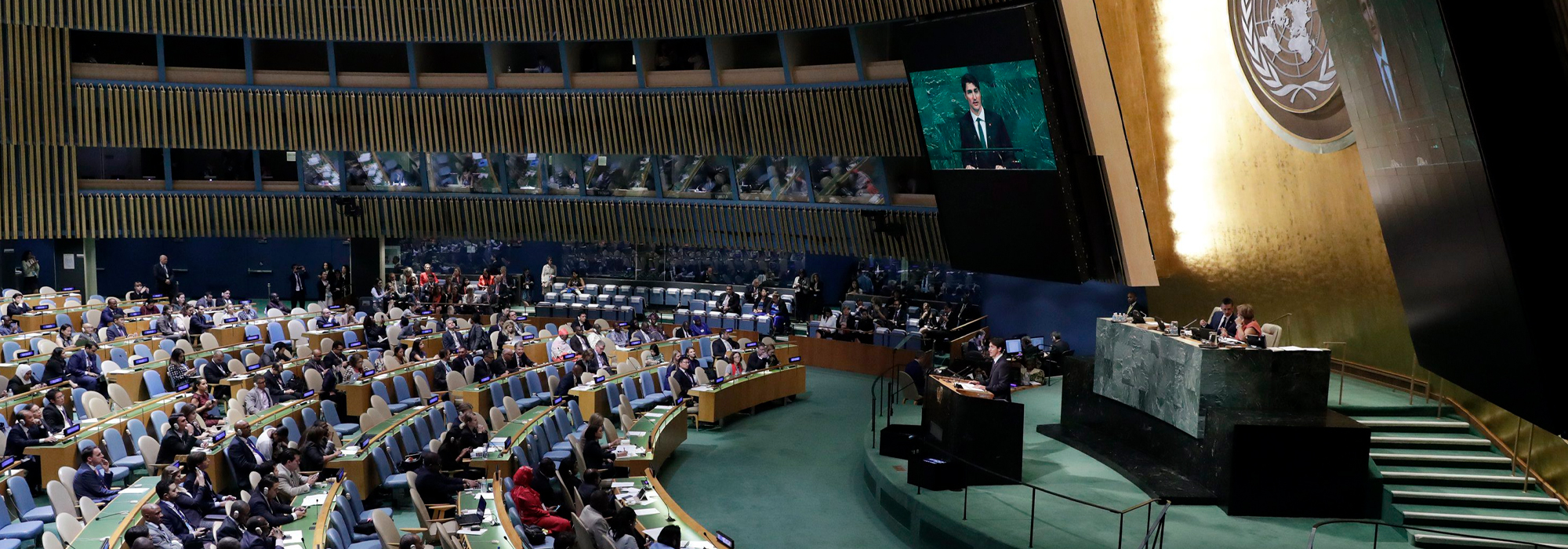
The opening of the new session of the United Nations General Assembly at the end of September marked 75 years since the creation of the UN. In 1945, the 51 founding members – including Canada – sought out hope and opportunity in the despair and chaos following World War II. These visionary states saw multilateralism – states acting together to pursue common goals – as the best way to “save succeeding generations from the scourge of war,” in the words of the UN Charter.
Common challenges such as COVID-19, climate change and migration have highlighted the weakened multilateral system. It’s become clear that now is the time for countries, especially Canada, to reconfirm their commitment to the UN vision as set out in the Charter: a rules-based order that would benefit states both big and small and bind each to the peace, security, and development of the other.
Re-imagining the role of the UN
World leaders have recognized this anniversary by adopting the UN 75 Declaration. The declaration represents a vision for collective action in response to today’s global challenges. It sets forth commitments on climate change, extreme poverty and armed conflict, among other universal issues. It is intended to galvanize a renewed commitment to multilateralism and to the role of the UN in meeting the realities of today.
Today’s world is very different from the one that faced the organization’s original founders. Multilateralism is being challenged by a new wave of nationalism, unstable alliances and global threats. The UN needs to respond to this new reality. Canada, a country that has long benefitted from and played an important role in multilateral initiatives, can play an important role in re-imagining the UN to be relevant today.
The UN is the world’s foremost multilateral institution, one where almost every country in the world is represented and where, through the General Assembly and its many bodies, every country has an equal say. The UN provides a platform where these countries can advance both national and collective interests.
Under the auspices of the UN, the current multilateral system has had many successes. It has helped states mediate disputes, facilitate trade and economic development and create common standards. The eradication of smallpox in 1980, the independence of Timor Leste in 2000, the adoption of the Global Compact for safe, orderly and regular migration in 2018 and the advancement of human rights through many international conventions were all shepherded through UN-based processes and frameworks.
The undermining of the multilateral system
For 75 years we have lived in a relatively predictable and stable world. But the successes of multilateralism are not always immediately evident or directly felt. As a result, we have taken multilateralism for granted. The rise of isolationism, populism and national protectionism across much of the globe undermines the very premise of a multilateral system.
The UN has become the target of simplistic and often untrue rhetoric that preys on people’s fears. By turning inward, governments favour national policies rather than collective responses to transnational challenges. The weakened multilateral system increases distrust amongst states and nationalist policies are favoured over agreed international standards and rules. This results in policies that may result in higher global temperatures and instable global economic markets.
If there was proper global leadership who reacted quickly, information was transparent and trusted and states worked together through established mechanisms including with the WHO and other UN entities, COVID-19 response would have been better managed and its impact likely reduced.
With the arrival of COVID-19, however, we see the consequences of weakened multilateralism. The disengagement of states in UN processes and entities, a lack of transparency and poor information sharing as well as UN bodies undermined by poor management structures over the years have made the system less effective. The need to tackle the challenges of pandemics, climate change and migration – all problems that transcend borders – illustrates how vital it is for countries to reconfirm their commitment to the UN and multilateralism.
In 2020 the world is more complex; countries, corporations, and people are more inter-connected and more inter-dependent. Global challenges that cannot be solved by individual states acting alone are mounting. The re-endorsement of collective action in the UN 75 Declaration takes on even more significance in that context. But UN multilateralism must adapt to the current world.
Canada must take an active approach
Canada has benefitted from the stability created through this multilateral framework. As a country dependent on trade, multilateralism has supported its social and economic growth. As a medium-sized country, Canada’s foreign policy and security interests have been best realized when cooperating with other states. Canada’s continued security and economic growth depend on a stable and predictable world.
The value of multilateralism for Canada is evident in the way the country’s place in the world has been defined through leading many initiatives at the UN. These include Prime Minister Pearson’s proposal for a peacekeeping force in the Suez, Prime Minister Mulroney’s galvanizing campaign against apartheid in South Africa and former Minister of Foreign Affairs Lloyd Axworthy’s leadership on the Mine Ban Treaty. Robust, principled engagement at the multilateral level has enabled Canada to advance its values and contribute to creating a more secure, just and free world.
In his address to the UN General Assembly this year, Prime Minister Justin Trudeau called on the world to “take real action together” and update the system. He noted that the UN depends on “the political will of the member states” and encouraged states to work together to shape the future. With the growing uncertainty of the emerging order, it is vital Canada leads this call.
Canada must do more than simply endorse the UN 75 Declaration. It must actively be part of the transformation of the multilateral system, including of the UN. The Prime Minister outlined three areas where Canada would continue to focus its support: peacekeeping, international assistance and empowerment of women. There are a number of actions Canada can take to help define the UN multilateral system for today’s reality.
It is important Canada actively engages in multilateral platforms and puts forth a clear vision of a system that respects human rights and a rules-based order. To do so, Canada must work with allies who support common issues. For example, working with likeminded countries to redefine security through our feminist foreign policy will create a more peaceful and equitable world. Equally importantly, Canada must engage in closer dialogue with states that hold different views, to build trust and transform positions.
Canada must consistently stand up against injustices when values upheld in UN declarations are under threat. Calling out injustices strengthens an international system based on rules and order. But Canada can only be credible if it lives up to these values at home. That means implementing promises and commitments made at the UN, such as implementing the United Nations Declaration on the Rights of Indigenous Peoples.
Canada must adopt a consistent and coherent whole-of-government approach to maintain commitments to human rights and the rule of law. Yet, for example, one branch of government is selling arms that continues the war in Yemen while another branch is providing assistance to civilians bearing the brunt of the same brutal conflict. Such two-handedness undermines support for the UN’s efforts to broker peace.
Canada must fulfill global commitments in full and on time. These commitments include meeting the Paris Agreement greenhouse gas emissions targets and the Global Compact for Safe, Orderly and Regular Migration objectives. Likewise, Canada’s commitment to more robust peacekeeping in recent years, including deploying more women, is much needed to promote peace and security globally. Yet Canada is currently playing its smallest role in almost 60 years.
In an increasingly unpredictable world, Canada, and Canadians, would be well-advised not to take the UN for granted. The UN was created in the shadow of extreme forms of nationalism in order to prevent similar atrocities in the future, by bringing states into a common forum and showing they would achieve greater success together than apart. The UN 75 Declaration provides Canada with an opportunity to revitalize the multilateral system and to protect Canadian stability and prosperity for the next 75 years.
Photo: Prime Minister Justin Trudeau speaks during the General Debate of the 72nd United Nations General Assembly at UN headquarters in New York, New York, on September 21, 2017. EPA/JASON SZENES









